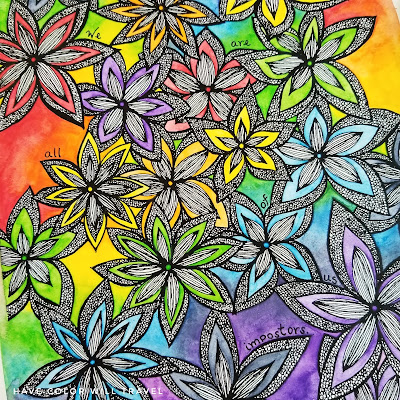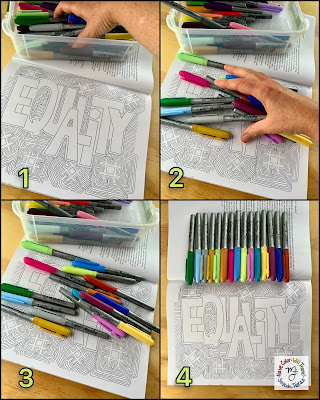Impostor Syndrome And How I Use It To My Creativity's Advantage
*Any links to supplies found on Amazon are affiliate links. Should you decide to bring home an art tool I’m talking about and purchase it through the links found here, a few pennies of that purchase are distributed to me. It isn’t much, but it (slowly) adds up—it’s a lovely way to support the content that I create, and it comes at no cost to you, which is awesome, too. Thanks, in advance, to anyone who supports my art in this way; I really appreciate it!
And, that's why Have Color Will Travel's most recent Free Coloring of the Month page has the words We are all of us impostors hand written among a collection of wild doodled blooms.
 |
| A silver lining of sheltering in place over the last 19 weeks is that there has definitely more time to explore my own creativity on the weekends. I printed this illustration on Fabriano 90lb hot press watercolor paper and colored it with Faber-Castell Albrect Durer Watercolor Pencils. Rainbow palettes have been my jam during the pandemic, so it made sense to just splash ROYGBIV into all the negative space of this coloring page and see what happened. I am rather happy with the end result and the page is hanging up proudly in my art studio:) |
It honestly feels like just about everyone suffers the mental burden of feeling like an impostor. Teachers, leaders, writers, parents, friends, family, famous folks, strangers on the internet - everyone has impostor syndrome, which, actually used to be called "impostor phenomenon" back in 1978 according to my very brief research into the history of the idea of an individual having persistent feelings of being an impostor, a fact I found fascinating, and also liberating for me, personally. I find the word phenomenon to be far less full of doom and gloom. In my experience, syndromes are inescapable and completely out of your control (all the physical health syndromes I have are permanent, much to my dismay). I like thinking of my mental and emotional health with a little more optimism, as something I might have a modest measure of control to affect. The word phenomenon feels less like a box I'm permanently trapped in than the word syndrome.
I mean, I have it, impostor syndrome, for sure. And, here is my list of very legitimate reasons for why I deserve to call myself an impostor:
- I do not have an art degree, and yet the work I do with Have Color Will Travel frequently puts me in the position of "Artist with a capital A" (and, sheesh, all artists have art degrees!).
- I get labelled "an expert" frequently in areas I know for a fact I am just barely making the grade (a better description of me is "enthusiastic and eternal student!")
How does my list of "very important reasons" measure up to yours? All of us impostors have them, right, these "very important reasons?" We don't just abstractly feel like an impostor, even though that's the expression folks use to describe their experience with impostor syndrome. We all have "very important reasons why" we do not deserve a particular title, job, or responsibility (in my work as a coloring & creativity facilitator, folks frequently share with me their struggles with impostor syndrome). And, they are epic legitimate, these memorized reasons, every last one of them: no proper education, no proper experience, far too old, far too young, far too "not looking, speaking, or dressing the part" one has been asked to play. Plus, I know I'm not alone in feeling that these reasons also have impeccable timing. When I am doing, when I am creating, when I am in the process of something incredibly important to me, my legitimate "very important reasons why" I'm an impostor starting singing in my head so loudly (well, my voice of the impostor sings - perhaps yours mumbles or barks?), it can feel like a Herculean effort to achieve or complete anything.
But, despite their volume and super seriousness (and no, I'm not kidding - our "very important reasons why" we can't make the grade in our own estimation are no laughing matter), we still manage to get most of the work done that matters to us. We still teach, we still lead, we still create, we still play, we still build, we still parent, we still tend to our responsibilities and opportunities, despite these reasons consistently trying to tear us down to our "rightful size."
And, it's right here that I want to stop and pinpoint my focus for a bit: that impeccable timing.
I've spent years trying to cure or at least curb my impostor syndrome, to convince myself of my worth, my skills, and my right to be doing whatever it was I was doing.
Years.
But, regardless of the knowledge I sought, the experiences I gained, the accolades and recognition I received, feeling like I was lying to everyone, like I was play acting and bound to be caught masquerading as someone I wasn't, just would not stop dogging me right when it hurt the most. My continued struggles with recognizing my qualifications and value are definitely not unique (remember, the Free Coloring of the Month page reads "We are all of us Impostors.") Perhaps that's why the mental health community settled on the word syndrome over phenomenon - experience taught them thoughts of being an impostor are persistent little boogers that take a licking and keep on ticking, no matter what. Which is incredibly frustrating! Feeling the impostor is so time consuming and emotionally exhausting; how much more enjoyable would life be without trying to ignore that voice in our heads that keeps telling us we aren't qualified for our lives?!
Here's wild idea: how about we cut ourselves some slack and stop trying so hard to ignore the voice of the impostor?
Even crazier: how about we actually listen to it?
Hear me out (pun intended).
What if the message of feeling the impostor isn't piping up inside our heads and hearts to make us feel small and unprepared?
Sure, that mean grownup voice lists those "very important reasons" for, well, very important reasons: our education may not be exactly what it's supposed to be, our experience may have some gaps in it here and there, our personal style choices, our ages, all our descriptors may be not exactly fit the bill of the role or responsibility we are filling or trying to fill - that actually may all be very true. But, did any of those "facts" even matter before we had the audacity to try something new, something big, something challenging, something outside our comfort zone, something that really mattered to us? I'm betting your answer to that question is the same as mine: No. Rather than focusing on the actual words our impostor voice throws at us (seriously, don't listen to that sh*t - they.aren't.actually.important.), we should instead tune in to where and when our impostor syndrome starts making the most noise.
Like I said, flares in impostor syndrome have impeccable timing, and that timing is trying to send us a message that our fear of failure wants us to ignore. And, that message is this: when we are feeling the most like an impostor, that's usually (hey, I'm not a doctor, just an artist that enjoys talking with folks/thinking about this sort of thing, a lot; my ideas may not be helpful for everybody, so yeah, usually) when we are doing or prepping something REALLY important to us, something that truly matters. How fabulous a gift is that self-knowledge?!
Yes, it feels absolutely f*cking miserable to experience impostor syndrome; when it rages, it can most definitely become an all encompassing pit of despair. But, some people live their whole lives never being able to figure out what they really care about, what really moves them, what motivates them. The voice of the impostor, vicious though it is, also grants us great insight into our heart's desires. If thoughts of being unqualified, undeserving, unprepared for whatever it is you are working on start attacking you, ignore the words but take heed of their raucous existence. It's trying to tell you something super valuable: that you really care about what you are doing and how well you are able to do it. How about we use that knowledge to prioritize our lives rather than letting it force us into corner, cowering, afraid of being ratted out as a fake?
Sounds optimistic, I know. Feeling "less than" day in and day out (yes, that can happen) is a heavy emotional load to carry. But, since personally focusing on impostor syndrome over these last few months, whenever a crisis of self-faith struck me (omigawd - anyone else notice the voice of the impostor having amped up during the pandemic?!), rather than trying to turn the negative noise in my head off or attempting to rewrite the internal dialogue (that's a technique that can be helpful for folks, too, so please don't think that doing so is a waste of time - it just isn't super effective for me), I've taken to perceiving the wave of massive self-doubt as being a sign, and a good sign at that. Listening for the voice of the impostor has helped me prioritize my time, my life (and it couldn't have come at a better moment as EVERYONE in my family now works from home with me and is ridiculously distracting -- thanks for that, COVID19), and I dare say it has helped me feel more confident in my decisions.
If I'm feeling like an impostor in any area of my life now, rather that falling prey to "the very important reasons" why I should quit something, I walk away from that moment feeling 100% certain that I'm on the right track and I should keep going, full steam ahead with whatever it is I'm doing.
Yes, writing this blog post was a slog through loud, nasty impostor-full voices.
Ironic right? My impostor syndrome was a total rage monster while I was writing about managing my impostor syndrome.
*sigh*
But, like I said, since having all this time during the pandemic to think about my personal experience with impostor syndrome, that wicked, dream killing noise doesn't come across in my head as a message to pay attention to, but rather as a sign that I am onto something that's important to my heart.



Comments
Post a Comment